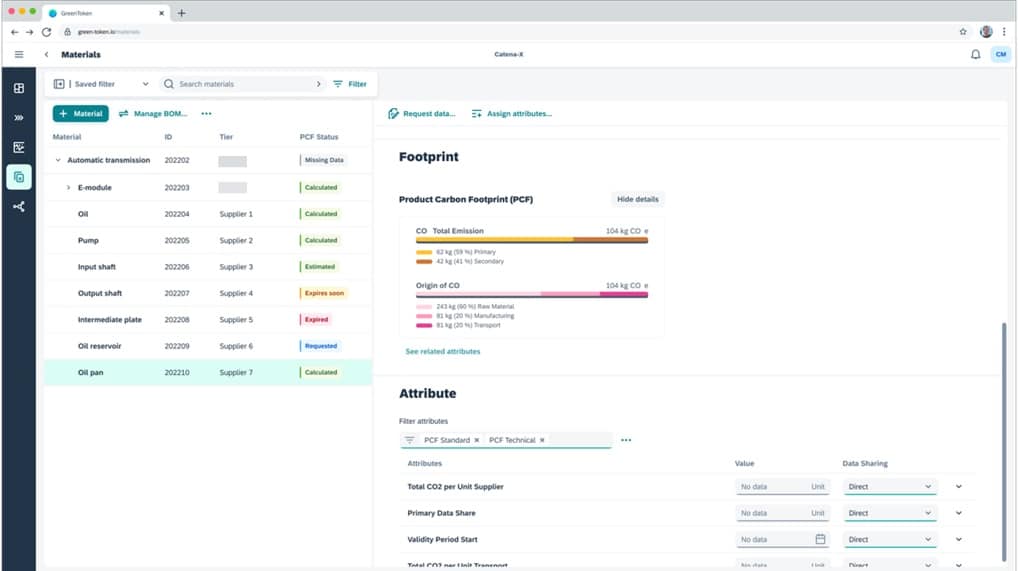Data is a driving force when it comes to reduction of carbon emissions. Catena-X is establishing a data ecosystem that creates the transparency of emission information from business partners across the end-to-end automotive value chain.
SAP Industry Network for Automotive packages help enterprises gain insights into their product carbon footprint data and identify further potentials in reducing greenhouse gas (GHG) emissions.
Scope 3 Emissions: The Biggest Challenge to Achieve Net Zero
Despite the massive disruptions that businesses are currently facing, climate change remains the most critical challenge that industries must jointly tackle. To achieve the goal of the Paris Agreement of limiting global warming to 1.5°C — which would reduce the possibility of initiating the most dangerous and irreversible disasters of climate change — net zero CO2 emissions need to be secured globally around mid-century. The European Union (EU) set an even more ambitious target to reach climate neutrality by 2050.
This means, in short term, that GHG emissions need to be reduced by more than 50% by 2030 in order to set a responsible pathway to meet the net zero target.
Although the largest companies have specifically articulated sustainability or carbon neutrality as their strategic goal, few have painted a clear and comprehensive action plan for the transition. Regulations such as the Corporate Sustainability Reporting Directive (CSRD) or new rules proposed by the United States Securities and Exchange Commission (U.S. SEC) on disclosing corporate carbon data leave businesses no time for empty green statements. The time to act is now!
Why is it so difficult to report on carbon emissions? While reporting of scope 1 (direct emissions from owned or controlled sources) and scope 2 (indirect emissions from the generation of purchased energy) emissions has already been well established in many companies throughout the world, visibility into the GHG emitted through the supply chain (scope 3), which constitute the significant share of the overall emission, is often not sufficient.
In the automotive industry for instance, 98% of total GHG emissions are scope 3 emissions. That is why it is even more crucial to identify carbon footprint reduction opportunities along the supply chain. Lack of trust, lack of access to high-quality data, inconsistent methodology or standards of data accounting, and lack of interoperable technology solutions across the highly complex automotive supply chain are the main obstacles to overcome.
Unleash the Network Power for Decarbonization
To meet sustainability and regulatory requirements, companies need to work together with partners, suppliers, and customers and establish transparent processes and common data standards — from material acquisition to manufacturing to distribution.
As the first open and collaborative data ecosystem, Catena-X Automotive Network is targeting a more sustainable industry value chain by incorporating all participants involved and enabling the data transparency. Tracking the product carbon footprint is one of the first use cases that Catena-X is now addressing. This is the starting point for a better understanding of the scope 3 GHG emissions, which sets the foundation of enforceable decarbonization opportunities.
On one hand, a common accounting and reporting methodology on product carbon footprint data is required to support the consistency, comparability, and verifiability of the data sourced from the network partners. By partnering with the World Business Council for Sustainable Development (WBCSD), Catena-X adopts the framework of CO2 calculation scheme and data model.
Earlier this year, SAP was the first organization in the world to achieve a standardized carbon footprint value in a WBCSD proof of concept. Importantly, the standardized approach also encourages network partners to move away from unspecific industry average measurements and toward using accurate primary emission data.
On the other hand, technology is key to operationalizing emission accounting and sharing. With its longstanding industry process know-how as well as solution best practices, SAP acts strongly as a key enabler in product carbon footprint data tracking within the automotive network.
Industry Network Solutions Empower Automotive Value Chain in Chasing Zero
With GreenToken by SAP, companies can share their product carbon footprint with their business partners in an easy, efficient, and secure way.
 GreenToken is a Web-based, subscription SaaS solution striving to create accountability and transparency across the material supply chain. Being compliant with the standardized data model defined with WBCSD helps ensure data consistency across the network.
GreenToken is a Web-based, subscription SaaS solution striving to create accountability and transparency across the material supply chain. Being compliant with the standardized data model defined with WBCSD helps ensure data consistency across the network.
The product carbon footprint data can be managed and transferred easily on material level between direct business partners.
It leverages an energy-efficient form of blockchain to notarize and transfer carbon emissions via tokens from one supply chain member’s wallet to the next, without disclosing private or confidential data. As these tokens travel along the supply chain downstream, the collected information gets shared, creating a reliable, immutable, and auditable chain of custody. In addition, not only CO2 data but also other information such as the origin of parts and certifications can be shared via this trustful and verifiable approach.
The solution provides a secured open API, accessible to other carbon emission calculation tools or back end solutions for transactions. A direct integration with SAP ERP Central Component 6.0 and SAP S/4HANA software is in place.
Transactions can also be driven by import of CSV files or manually, which means that small and midsize enterprises (SMEs) without back end enterprise resource planning (ERP) solutions can also leverage GreenToken for carbon data sharing within the network.
“GreenToken’s novel approach has the potential to create an accountable and auditable network to scope 3 reporting that is lacking today,” said James Veale, co-founder of GreenToken by SAP. “What is more, we have already proved GreenToken at scale in other supply chains, and the solution is now ready for Catena-X.”
Hagen Heubach is global vice president and head of Industry Business Unit Automotive at SAP, and a Board Member of the Catena-X Automotive Network.
Heiko Flohr is senior vice president and head of Product Management for SAP for Discrete Industries, and a member of Guidance Board for Catena-X Automotive Network.
Leyi Liu is part of Solution Management for SAP Industry Network for Automotive and Catena-X Automotive Network.



